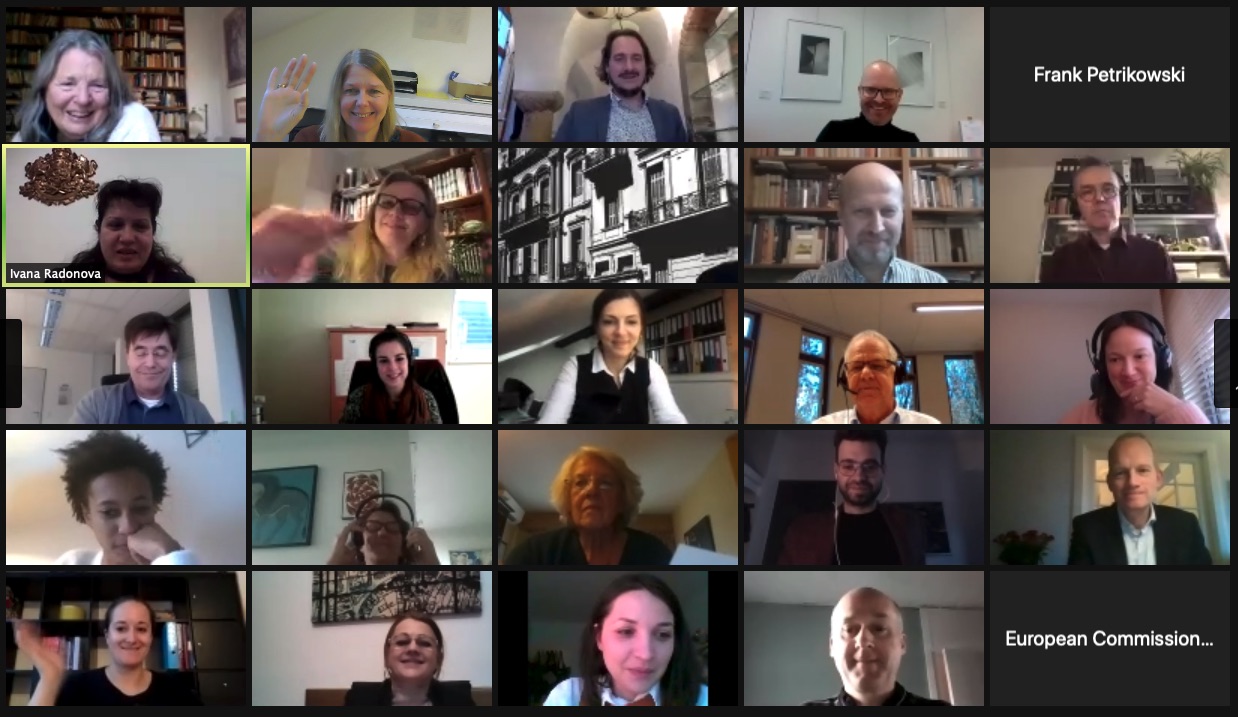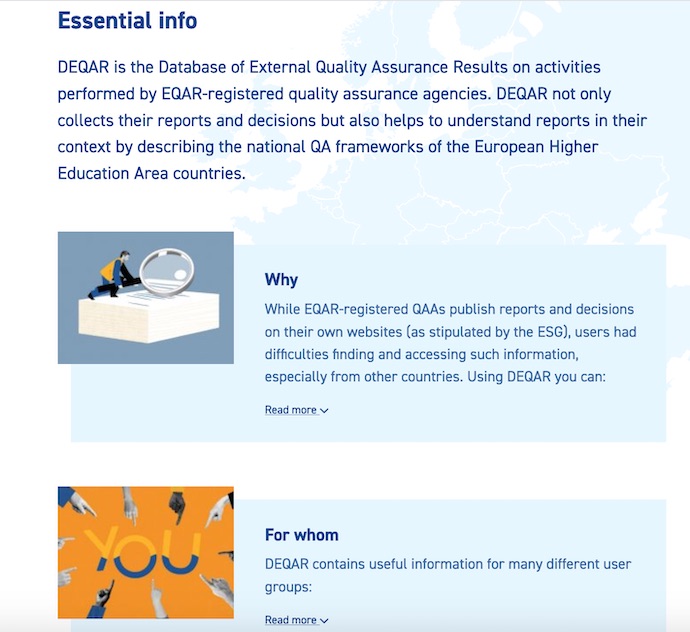EQAR NEWSLETTER - APRIL 2021
News: Register now lists 50 agencies | DEQAR update | ImpEA project concluded with toolkit | Microbol Survey Report published | EQAR Members Dialogue - January 2021 | Website changes
Register now lists 50 agencies
At the latest Register Committee meeting of 18 March, the Committee approved the initial applications of two agencies:
The Register Committee found that both agencies demonstrated their substantial compliance with the ESG, bringing the total of EQAR-registered agencies to 50, an alluring round number!
Some more numbers; since the Register started its work in 2008, the Register Committee considered 142 applications, with a success rate for initial applications of 75%. Check out the breakdown of these numbers as well as the full decisions of the Register Committee.
The Committee also considered various Change Reports, which is an important, but less well-known aspect of the work of the Register Committee. Registered agencies inform EQAR of any substantive changes (merger, organisational changes, new QA activities etc.) that may affect the registered agency’s substantial compliance with the ESG.
Read more about the last Register Committee meeting and find out which agencies recently reported substantive changes.
Following up on discussions held at the EQAR Members' Dialogue, the Committee also considered:
- EQAR’s Self Evaluation Report and its own contribution therein. (Find out more about the external evaluation.)
- A possible more targeted approach to review agencies that are going through their third or further review against the ESG, in order to avoid reviews becoming a repetitive exercise.
DEQAR update
Activities within the framework of the DEQAR CONNECT project, which is now half-way through, are making headway.
ENIC-NARIC integration
National recognition information centres (ENIC-NARICs) already make use of DEQAR data for the recognition of foreign qualifications from those higher education institutions/programmes present in DEQAR. The idea of ENIC-NARIC integration was conceived to further speed up and facilitate this process, and to assist the four ENIC-NARIC project partners to use the Web API to integrate DEQAR in their recognition workflow and digital credentialing. Three of them have started piloting the integration and the fourth, currently undergoing a major restructuring of their system/platform, is planning a direct DEQAR integration in their new upcoming system in summer.
Check out what the integration entails and what it looks like
Europass prototype
One of the specific DEQAR CONNECT activities is to create a compatibility layer for Europass and its Digital Credentials Infrastructure (EDCI), so that DEQAR data can feed directly into the Accreditation Database underlying the EDCI. Several meetings with the Europass team at the Commission (DG EMPL) were held on the interface between DEQAR and the Europass Accreditation Database. A first functioning prototype has already been implemented and DEQAR data can be loaded into the Europass Qualifications Dataset Register (QDR) on a per-country basis.
Peer support
Peer support falls under the DEQAR CONNECT aim of “expanding coverage to EHEA countries currently under-represented in DEQAR, by supporting the participation of agencies that could not join DEQAR in the first stage”.
The peer support phase started in May 2020 and finished at the end of February 2021. Experts (i.e. agencies with DEQAR experience, DEQAR developers and EQAR staff) gave advice to 16 quality assurance agencies, and mentored them in their efforts to establish an automated transfer of data to DEQAR. This resulted in 12 project partner agencies uploading reports and decisions so far and others working on directly connecting their databases with DEQAR.
State of play in numbers
- Participating EQAR-registered agencies: 40
- Reports in DEQAR: 57803
- Coverage: 21 EHEA higher education systems with QA reports for at least 50% of the higher institutions
ImpEA project concluded with toolkit
The aim of the ImpEA project, in which EQAR was associate partner, was to support efficient implementation of the European Approach for Quality Assurance of Joint Programmes.
This resulted in a very practical European Approach Online Toolkit, published in December, an excellent resource for both higher education institutions and quality assurance agencies. The toolkit consists not only of written explanations but also of step-by-step video guidelines, beginning with “What is the idea of the European Approach?”.
Read more and check out the Toolkit
On the EQAR website you will find a list including examples where the European Approach for Quality Assurance of Joint Programmes was used in practice to evaluate or accredit a joint programme.
Check out who has used the European Approach
Microbol Survey Report published
The aim of the Microbol (Micro-credentials linked to the Bologna Key Commitments) project is for ministries and stakeholders to explore, within the Bologna Process, whether and how the existing Bologna tools can be used for or adapted to micro-credentials. EQAR is associate partner of this Erasmus+ -funded project, coordinated by the Flemish Ministry of Education and Training.
To this end a survey was circulated to determine the state of play of micro-credentials in the European Higher Education Area. The results of the survey have been published in February and reveal that regulatory approaches differs greatly between countries. Nearly all countries indeed consider the ESG applicable to micro-credentials, while there are differences to what extent micro-credentials are already “covered” by existing internal or external QA mechanisms. Most countries consider that programme accreditation would not be scalable to individual micro-credentials and express preference for an institutional approach to external QA.
Read more and download the report
EQAR Members Dialogue - January 2021
The 10th EQAR Members’ Dialogue was held on 14-15 January 2021, and revolved around EQAR’s self-evaluation process. Results of several surveys (among EHEA governments, stakeholders and QA agencies) were shared and discussed, along with suggestions on how to tackle some of the proposed areas for improvement.
During a panel discussion on key trends and policy developments, guest speakers Liz Marr – Pro-Vice-Chancellor Students of the Open University (UK), Emily Palmer – Secretary General of Una Europa and Diane Freiberger – Managing Director of FIBAA covered questions about the flexibility of the ESG, the challenges for EQAR in the changing landscape of higher education (e.g. digitalisation, increased cross-border collaboration between higher education institutions and new/flexible learning paths) and the importance of the national QA systems.
During the parallel sessions ideas were floated and proposals were made on how EQAR could contribute better to the sector with analyses and policy briefs, support the EHEA key commitments, and better disseminate and promote the information available from DEQAR and the Register Committee decisions.
These suggestions will be discussed further and feed into the self-evaluation report, which will be published in May.
Website changes
A number of (minor) website changes have been implemented, some of them planned and others initiated after some survey responses (for the self-evaluation) hinted that it was not always straightforward where to find what. 
The menus under “About” and under “Knowledge Base” have thus been re-arranged according to a more logical classification.
Content changes, with clearer bite-sized information on what is EQAR, DEQAR and the Register, have also been made.
Have a look and give us your feedback!

